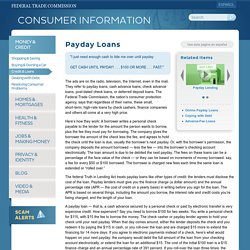

Instructional Strategies. Payday loans. What is a payday loan?

Is applying for a payday loan online safe? Search or browse for answers to these and other common questions. Sort by: most helpful | most viewed | recently updated What is a payday loan? A payday loan – which might also be called a “cash advance” or “check loan” – is a short-term loan, generally for $500 or less, that is typically due on your next payday. What are my rights under the Military Lending Act? If you’re an active duty member of the armed forces or are on active Guard or Reserve duty, the Military Lending Act (MLA) says that you can’t be charged an interest rate higher than 36% on some types of consumer ...
What does it mean to renew or roll over a payday loan? Generally, it means you pay a fee to delay paying back the loan. Is applying for a payday loan online safe? Any time you give out your sensitive personal and financial information on the Internet there are risks. Payday Loans. "I just need enough cash to tide me over until payday GET CASH UNTIL PAYDAY!

. . . $100 OR MORE . . . FAST. " The ads are on the radio, television, the Internet, even in the mail. They refer to payday loans, cash advance loans, check advance loans, post-dated check loans, or deferred deposit loans. The Federal Trade Commission, the nation’s consumer protection agency, says that regardless of their name, these small, short-term, high-rate loans by check cashers, finance companies and others all come at a very high price. Here’s how they work: A borrower writes a personal check payable to the lender for the amount the person wants to borrow, plus the fee they must pay for borrowing.
The federal Truth in Lending Act treats payday loans like other types of credit: the lenders must disclose the cost of the loan. A payday loan — that is, a cash advance secured by a personal check or paid by electronic transfer is very expensive credit. Alternatives to Payday Loans. Learning Bank - The FDIC's Webpage for Students, Teachers, and Parents. Information for the Individual Investor. Protecting America's Consumers. Investor.gov. Employer-Sponsored Plans. Retirement plans generally fall into two categories: defined benefit plans and defined contribution plans.

A defined benefit plan promises you a specified monthly benefit at retirement. The benefit may be a fixed dollar amount or may depend on a plan formula that considers factors such as salary and years of service. Defined benefit plans also are known as pension plans. Employers sponsor defined benefit plans and typically hire investment managers to make investment choices.
The employer shoulders the investment risks. A defined contribution plan, such as a 401(k) plan, does not promise you a specific payment upon retirement. In a defined contribution plan, the employee shoulders the investment risks, and the value of the account will fluctuate due to changes in the value of the investments. Please use the menu on the left to explore different employer-sponsored plans. Self-directed Plans-Individual Retirement Accounts (IRAs) Individual Retirement Accounts (IRA) provide tax advantages for retirement savings.

You can contribute each year up to the maximum amount allowed by the Internal Revenue Service. There are several types of IRAs available: Traditional IRA. Contributions typically are tax-deductible. You pay no taxes on IRA earnings until retirement, when withdrawals are taxed as income. A rollover is a tax-free distribution of cash or other assets from one retirement plan to another retirement plan. Additional Information Investor Alert: Self-Directed IRAs and the Risk of Fraud. Compound Interest Calculator by CEE. Choose to Save® Beginners' Guide to Asset Allocation, Diversification, and Rebalancing. Even if you are new to investing, you may already know some of the most fundamental principles of sound investing.

How did you learn them? Through ordinary, real-life experiences that have nothing to do with the stock market. For example, have you ever noticed that street vendors often sell seemingly unrelated products - such as umbrellas and sunglasses? Initially, that may seem odd. After all, when would a person buy both items at the same time? If that makes sense, you've got a great start on understanding asset allocation and diversification. Let's begin by looking at asset allocation. Asset Allocation 101 Asset allocation involves dividing an investment portfolio among different asset categories, such as stocks, bonds, and cash. Risk versus Reward When it comes to investing, risk and reward are inextricably entwined. The reward for taking on risk is the potential for a greater investment return. Investment Choices.